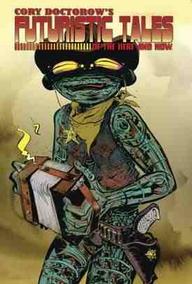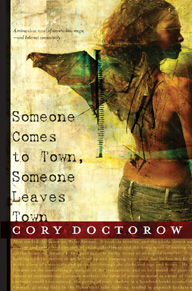News
The Guardian
My latest Guardian column, "Transparency means nothing without justice," is up. I wrote this before the G20 debacle (it was delayed due to an administrative problem at the Guardian), but all the points are just as relevant to the G20's climate camp as they are to last summer's version of it.
And here's where transparency breaks down. We've known about all this since last August – seven months and more. It was on national news. It was on the web. Anyone who cared about the issue knew everything they needed to know about it. And everyone had the opportunity to find out about it: remember, it was included in national news broadcasts, covered in the major papers – it was everywhere.
And yet ... nothing much has happened in the intervening eight months. Simply knowing that the police misbehaved does nothing to bring them to account.
Transparency means nothing unless it is accompanied by the rule of law. It means nothing unless it is set in a system of good and responsible government, of oversight of authority that expeditiously and effectively handles citizen complaints. Transparency means nothing without justice.
Transparency means nothing without justice
The Locus Award shortlist has been posted -- this is the list of the best science fiction books and stories of the year, as chosen by the general public. I'm immensely gratified to say that I'm on the list three times, for my young adult novel Little Brother, my collaborative novella True Names (with Ben Rosenbaum), and my novelette The Things that Make Me Weak and Strange Get Engineered Away.
The whole list is a great jumping-off point for exploring the best written sf and fantasy of 2008!
2009 Locus Award Finalists
Here's part seventeen of my reading of my 2005 novel, Someone Comes to Town, Someone Leaves Town.
MP3 Link
Cam writes in with just about the perfect parable about why DRM just sucks:
I thought you'd be amused to hear the circumstances which caused me to pick up and read Little Brother.
Being a pretty big nerd (I'm a tech director at Electronic Arts by day), I was excited to pick up a Sony ebook reader. I got the last one in the shop, which was actually a return - but the sales guy assured me that they'd "reconditioned it".
After taking it home and installing Sony's terrible, terrible ebook software I was only moderately surprised to find that I couldn't "authorise" my new reader to read their DRM-laden ebooks. It gave me the always helpful error code of "3-013". Googling this code told me that (of course) the reader was already authorised (presumably to the person who bought it the first time).
I contacted Sony's only means of support, which was a web form on their site. Hours later, I received a response telling me that I needed to call their support line, which was open until 6PM. Naturally this email arrived at 5:58PM, and the support line kindly informed me that I should call back the next day. I think their time calculation function must suffer from some floating point inaccuracy.
Cursing my now apparently totally useless $300 device, I decided to read a free ebook to tide me over until I could call Sony the next day. I'm a regular boing boing reader and remembered your posts on Little Brother, so I downloaded it and started reading.
Needless to say, not only did I really enjoy reading it (and yes I know it's nominally a book for kids!) but I've yet to make that call to authorise my device, and I've been reading more Creative Commons-licensed books.
So long story short, DRM turned me onto Little Brother and onto other CC-licensed works. I thought you might find that amusing.
Regards,
Cam Dunn
PS Nice work making Little Brother technically accurate in so many ways (ignoring the "near future" technologies). I get the impression that you'd lose your tech-savvy kid readers these days if you didn't get that stuff so right.
Internet Evolution
Here's my latest column for Internet Evolution: "Big Entertainment Wants to Party Like It's 1996" explains how the entertainment industry's greedy, naked lobbying tactics will be their undoing, since these victories end up backfiring because they arouse such public ire.
It's not that these companies can't get their laws on the agenda, and not that they can't cook the process to make it run favorably for themselves. For example, when Canada was considering its own version of the WCT, the entertainment giants saw to it that the parliamentarians in charge of the process only talked to multinational entertainment giants, without conducting any kind of embarrassing public consultation. They wouldn't even talk to the Canadian record companies -- just the multinationals.
The proposed laws -- Bill C60 and Bill C61 -- were complicated and took a lot of explaining. But here's what didn't take any explaining at all: "Your government is about to introduce sweeping, controversial regulations to the Internet, and they won't talk with anyone except the jerks who are suing all those music downloaders in the States about it -- they won't even talk to Canadian record companies!"
This made the Canadian lawmakers who backed the proposal look like sellouts (which they were); made the laws look like conspiracies (which they were); and made the geeks who cared about this stuff look like heroes (which they were). The complicated story about the law became a simple story about the process.
Likewise in New Zealand, where a new copyright provision called "Section 92A" made every geek in the country freak out in unison. 92A allows a rightsholder to have your Internet connection terminated by filing three unsubstantiated accusations of copyright infringement against you. No judge and no jury: just a rightsholder standing over you, able to administer the death penalty to your participation in electronic life without showing a shred of evidence.
Now, this is a little easier to explain to the general public -- the entertainment lobby isn't just stupid about process, they're also greedy in what they ask for -- but 92A was rammed through Parliament in a dodgy process that got those people who weren't interested in copyright or the Internet outraged anyway.
New Zealand's brilliant, tireless geeks organized around the clock, mounted a huge, high-profile global campaign through Twitter and blogs (they probably tripled the amount of international coverage New Zealand received), and forced the government to back down on its plans, sending the entertainment industry packing.
In France, the "colorful" Nicolas Sarkozy faced a revolt after trying to pass the New Zealand law there -- where it was called HADOPI -- and having it rejected by his own government.
Big Entertainment Wants to Party Like It's 1996
Here's part sixteen of my reading of my 2005 novel, Someone Comes to Town, Someone Leaves Town.
MP3 Link
Here's a talk I gave earlier this year at the O'Reilly Tools of Change for Publishing conference in NYC, about the way that DRM gives distributors control over publishers and writers. This talk went down very well, and is the source of "Doctorow's Law," which a lot of people have asked me about: "Any time someone puts a lock on something you own, against your wishes, and doesn't give you the key, it's not being done to your benefit."
There's some errata here, though: the Overdrive debacle was due to a licensing dispute, not a bankruptcy; and there's now a "DRM-free" option for the Kindle, but I can't find out if the file comes with legal encumbrances that would prevent people who buy one of these from moving it to a competing device (no one at Amazon will answer my queries about this). And I've also been told by Amazon that supposedly Audible will do DRM-free audiobooks, but they haven't answered repeated queries about the details of this.
TOC 09 "Digital Distribution and the Whip Hand: Don't Get iTunesed with your eBooks"
Here's part fifteen of my reading of my 2005 novel, Someone Comes to Town, Someone Leaves Town.
MP3 Link

|








